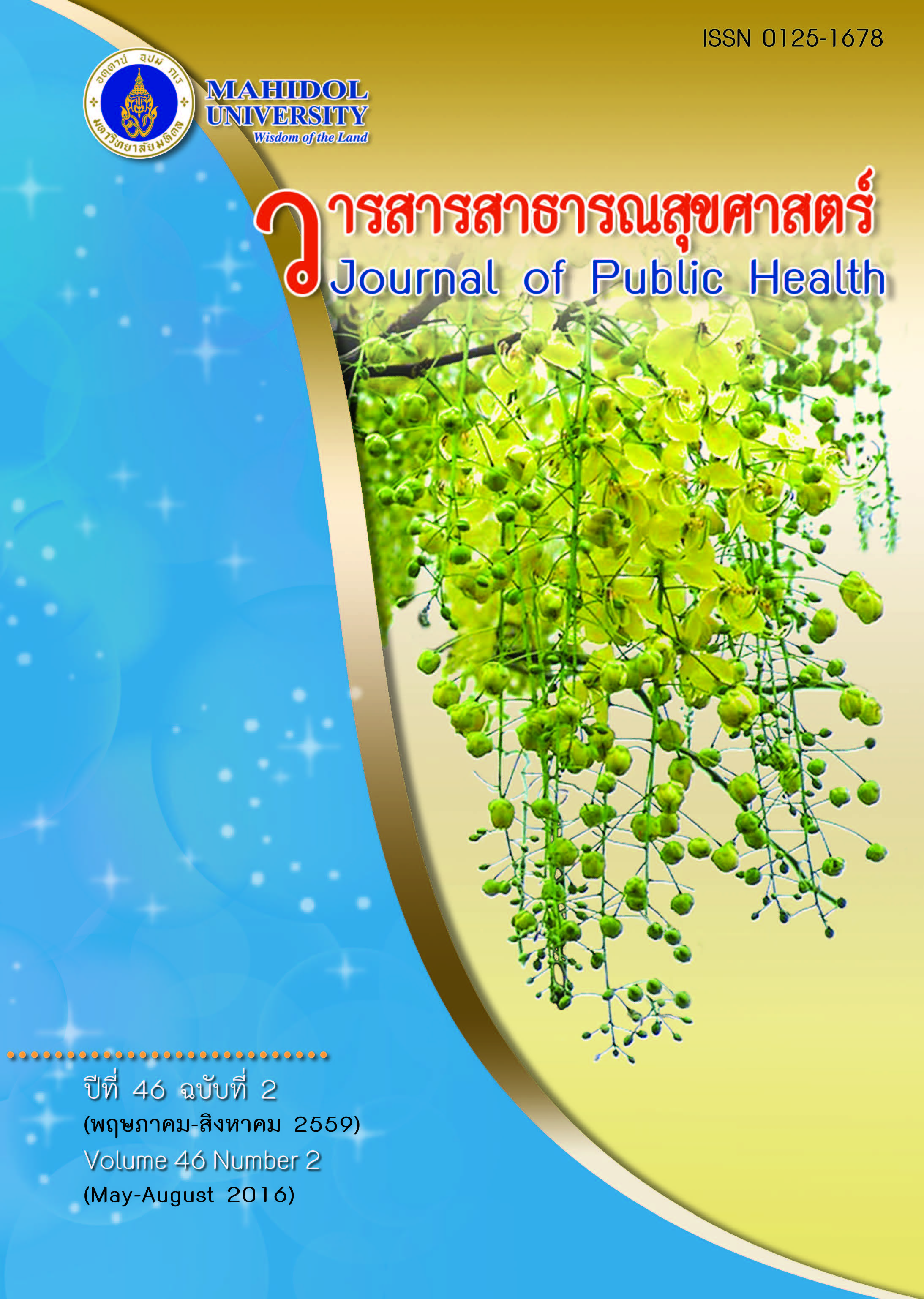การศึกษาองค์ประกอบที่จำเป็นในการพัฒนาดัชนีชี้วัดสภาวการณ์สุขาภิบาลอาหารขององค์กรปกครองส่วนท้องถิ่น
Keywords:
ดัชนีชี้วัดสุขาภิบาลอาหาร, สภาวการณ์สุขาภิบาลอาหาร, องค์ประกอบด้านสุขาภิบาลอาหาร, องค์กรปกครองส่วนท้องถิ่น, food sanitation index, food sanitation situation, food sanitation component, local administrationAbstract
บทคัดย่อ
ศึกษาองค์ประกอบที่จำเป็นในการพัฒนาดัชนีชี้วัดสภาวการณ์สุขาภิบาลอาหารขององค์กรปกครองส่วนท้องถิ่น ใช้ Delphi Technique ได้ 8 องค์ประกอบ ทวนสอบองค์ประกอบโดยศึกษาในเทศบาลจำนวน 201 แห่ง วิเคราะห์ข้อมูลเพื่อพัฒนาแบบวัดการดำเนินงานสุขาภิบาลอาหารขององค์การปกครองส่วนท้องถิ่น โดยใช้สถิติ Factor Analysis ทั้งเชิงสำรวจและเชิงยืนยัน วิเคราะห์การถดถอยทีละขั้น ได้สมการดัชนีชี้วัดสภาวการณ์สุขาภิบาลอาหารขององค์กรปกครองส่วนท้องถิ่น (Food Sanitation Index) ใช้สถิติ Mixture Models คำนวณค่าเฉลี่ยคะแนนของแต่ละจังหวัด คำนวณหาจำนวนระดับของสภาวการณ์สุขาภิบาลอาหารที่จะใช้เป็นเกณฑ์ในการแบ่งระดับของตัวแปร FS_index โดยสถิติ Baysian Methods คำนวณหาค่าความน่าจะเป็นของการเป็นสมาชิกของแต่ละพื้นที่ เพื่อคัดเลือกพื้นที่บรรจุลงในแต่ละระดับของสภาวการณ์สุขาภิบาลอาหาร วิเคราะห์ข้อมูลของ Mixture Models และ Baysian Methods ที่คณะวิจัยเขียนขึ้นผ่านโปรแกรม R นำผลลัพธ์การจำแนกคะแนนมาตรฐาน FS_index ของจังหวัดต่าง ๆ บรรจุลงในแต่ละระดับของสภาวการณ์สุขาภิบาลอาหาร นำมาลงในแผนที่ด้วยโปรแกรม MapInfo พบว่า มี 3 จังหวัดเท่านั้น คือ นนทบุรี (คะแนนมาตรฐาน 2.71) ยโสธร (คะแนนมาตรฐาน 2.35) และยะลา (คะแนนมาตรฐาน 1.58) มีผลการดำเนินงานดีกว่าจังหวัดอื่น เสนอแนะให้ศึกษาวิจัยอย่างต่อเนื่องโดยทวนสอบในภาคสนาม และประมวลปัจจัยที่มีอิทธิพลกับแต่ละองค์ประกอบ พร้อมเพิ่มกระบวนการที่พัฒนาต่อให้เป็น Thailand Food Sanitation Index (TFSI)
A Study of the Influencing Components for Local Administration Food Sanitation Index Formulation: FSI
ABSTRACT
The research aimed to study the influencing components for local administration food sanitation index formulation (FSI). Eight components were determined using Delphi technique. It was verified by study in 201 municipalities. Data was analyzed for local administration FSI using factor analysis both exploratory and confirmatory. The variables were analyzed by stepwise regression to determine the FSI equation and calculate the mean score of FSI in each province. The mixture model was used to classify the food sanitation situation. The Bayesian method was used to calculate the probability of the area membership and choose selected areas to each level of food sanitation situation. Data were analyzed using the program R written by the researcher team. The analyzed results of provincial FSI standard score was classified to each level of food sanitation situation and drawn in the map using the MapInfo Program. Only 3 provinces, i.e., Nonthaburi, Yasothon, and Yala, had food sanitation working performance levels better than other provinces. Recommendation for the ongoing study should directly verify the field study and analyze influencing factors of each component. Formulation processes are needed to achieve the Thai FSI.
Downloads
Published
Issue
Section
License
Creative Commons License CC-BY-ND


